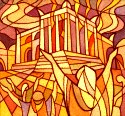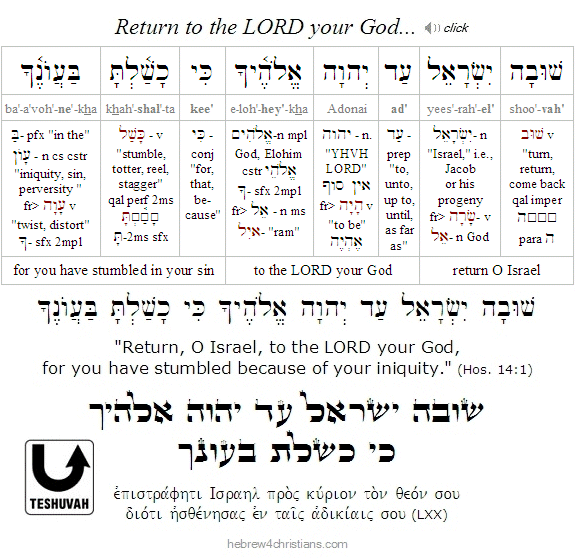|
THE SABBATH BEFORE TISHAH B'AV is called "Shabbat Chazon" (שַׁבַּת חַזוֹן), the "Sabbath of Vision," so named from the opening verse of the Haftarah: "Chazon Yeshayahu ven-Amotz" (חֲזוֹן יְשַׁעְיָהוּ בֶן־אָמוֹץ), the "Vision of Isaiah, the son of Amoz" (Isa. 1:1). When it was first recorded, Isaiah's vision of the destruction of the Temple was still future, and the Jews still had a chance to repent before the great tragedy befell them. However, since they did not repent, calamity finally overtook the inhabitants of Judah.... During Shabbat services, this portion is traditionally chanted using the same haunting melody as Megilat Eichah (Lamentations), the acrostic dirge of the prophet Jeremiah, who was an eyewitness to the destruction and fall of Judah and Jerusalem.
The haftarah opens with the statement, "Hear, O heavens, and listen, O earth, for the LORD has spoken" (Isa. 1:2). This opening immediately harkens back to Moses' prophetic song called the Ha'azinu, though the verbs are reversed. God's children have rebelled against Him, they have forgotten the LORD.... They have become "a sinful nation, a people laden with iniquity, offspring of evildoers, children who deal corruptly! They have forsaken the LORD, they have despised the Holy One of Israel, they are utterly estranged" (lit. they have become the "tail" or "hind side" of a brute beast) (Isa. 1:4). Since they have forgotten who they are, God has given them over to a debased identity: They were once called a "holy nation," but now they are called a "sinful nation"; they were once called a "seed blessed by the LORD," but now they are called a "sinful seed"; they were once called "children of the Living God," but now they are called "children who have become corrupt" (Metzudat David).
God rhetorically asks: "Why will you still be struck down? Why will you continue to rebel? The whole head is sick, and the whole heart faint. From the sole of the foot even to the head, there is no soundness in it, but bruises and sores and raw wounds; they are not pressed out or bound up or softened with oil" (Isa. 1:5-8). The LORD then asked why the people were not reflecting upon their suffering... Samaria had already fallen and the Israelites of the Northern Kingdom had suffered exile. Parts of Judah had also been overrun, yet none of this made any difference - the people went on their daily lives acting as if nothing needed to be changed. They continued as before, even at their religious services!
What's the use of chastening if you will not "get the point" of God's message? God uses affliction and pain to call you to come closer to Him - to get your attention - but if you refuse to come to Him for healing and then go on to complain, "Why are we smitten?" you will continue your rebellion, increasing it more and more. Some wounds are caused from the inner soul - your "whole head is sick" with mistaken beliefs and your whole heart aches with evil... Therefore you are sick "from the sole of the foot even to head" - some with open wounds (visible), but others with bruises (hidden pains). Despite God's "afflictions of love," Isaiah foresaw the horrible outcome of their apostasy: "Your land is desolate and burned down; devoured by foreigners, overturned before your eyes, and the daughter of Zion is left like ... a besieged city" (Isa. 1:7-8). Foreseeing further the great exile to come, Isaiah says, "If the LORD of Hosts (יְהוָה צְבָאוֹת) had not left us a "surviving remnant" (שָׂרִיד), we should have been like Sodom, and become like Gomorrah (Isa. 1:9).
לוּלֵי יְהוָה צְבָאוֹת הוֹתִיר לָנוּ שָׂרִיד כִּמְעָט
כִּסְדֹם הָיִינוּ לַעֲמֹרָה דָּמִינוּ
loo-lei · Adonai · tze-va-oht · ho-teer · la'-nu · sa-reed · keem-at
kees-dohm · ha-yee'-noo · la-a'-mo-rah · da-mee'-noo

"If the LORD of hosts had not left us a few survivors,
we should have been like Sodom, and become like Gomorrah." (Isa. 1:9)

The prophet then addresses faithless Judah and rebukes the nation for their vain show of religious observance: "Hear the word of the LORD, you rulers of Sodom! Give ear to the teaching of our God, you people of Gomorrah! What to me is the multitude of your sacrifices? says the LORD; I have had enough of burnt offerings of rams and the fat of well-fed beasts; I do not delight in the blood of bulls, or of lambs, or of goats. When you come to appear before me, who has required of you this trampling of my courts? Bring no more vain offerings; incense is an abomination to me. New moon and Sabbath and the calling of convocations - I cannot endure iniquity and solemn assembly" (Isa. 1:10-13). The syncretism of apostasy is detestable to the LORD, an insufferable contradiction. "How long will you go limping between two opinions? If the LORD is the true God, then worship Him, and if the Baal is, then worship him" (1 Kings 18:21). A heart that is indifferent or "lukewarm" toward the LORD invalidates and nullifies whatever merit religious rituals are thought to afford (Rev. 3:16). As the prophet later said, "Because this people draw near with their mouth and honor me with their lips, while their hearts are far from me, and their fear of me is a commandment taught by men, therefore, behold, I will again do an amazing thing for these people – an absolutely extraordinary thing. Wise men will have nothing to say, the sages will have no explanations" (Isa. 29:13-14; Matt. 15:8-9; Mark 7:6-7). Hypocrisy leads to spiritual stultification, a depraved mind that is unable to think correctly.
Regarding the abhorrence of the sacrifices, the LORD is using hyperbole, of course, since He established the sacrificial system as the means for procuring atonement for the people (the final expression of which was the glorious sacrifice of the Messiah for our sins, of course). But sacrificial offerings are of no spiritual significance unless they express a person's desire to draw near to the LORD God of Israel. Sacrifices offered without righteousness (i.e., faith: Hab. 2:4) are meaningless and offensive to God. Indeed, "serving" God by empty rituals is a farce and an abomination (תּוֹעֵבָה) to the LORD... The same can be said regarding observing "new moon" festivals and the other appointed times of the Jewish calendar (Isa. 1:14). Religious "observance" apart from the the truth of the Holy Spirit is detestable to God. It is a "burden" to His soul and something that makes Him "weary..." Likewise regarding insincere or formulaic prayer: "When you spread out your hands, I will hide my eyes from you; even though you make many prayers, I will not listen; your hands are full of blood" (Isa. 1:15). This likely refers to the practice of various "liturgical prayers" - mechanical recitations that were said in the assumption they bring merit - as well as to the Birkat Kohanim, the "priestly blessing," when the arms of the priests were outstretched to bless the people. God will ignore all such insincere petitions and feigned acts of piety. As James later wrote: "You desire and do not have, so you murder. You covet and cannot obtain, so you fight and quarrel. You do not have, because you do not ask. You ask and do not receive, because you ask wrongly, to spend it on your passions. You adulterous people! Do you not know that friendship with the world is enmity with God? Therefore whoever wishes to be a friend of the world makes himself an enemy of God" (James 4:3-5).
Hebrew Lesson
Hosea 14:1 Hebrew reading (click):
The LORD calls for inward heart change: "Wash! Purify yourselves! Remove your sinful deeds from my sight. Stop doing the evil! Learn to do good; seek justice, relieve the oppressed; bring justice to the fatherless, plead the widow's cause. Come now, let us reason together, says the LORD: though your sins are like scarlet, they shall be as white as snow; though they are red like crimson, they shall become like wool" (Isa. 1:16-18). Isaiah's call to wash yourself and "purify your heart" echoes James' later call: "Cleanse your hands, you sinners, and purify your hearts, you double-minded" (James 4:8). This is a cleansing of the heart's intentions, the source of what moves personal actions and renders decisions. "Learn to do good and pursue justice" (לִמְדוּ הֵיטֵב דִּרְשׁוּ מִשְׁפָּט). Learn well the message of God's heart (Isa. 1:17). Truth is "self-authenticating." Act according to the truth and you will know the truth (John 13:17). Do not deceive yourself by merely hearing the message but not living it out in your daily life (James 1:22).
לְכוּ־נָא וְנִוָּכְחָה יאמַר יְהוָה
אִם־יִהְיוּ חֲטָאֵיכֶם כַּשָּׁנִים כַּשֶּׁלֶג יַלְבִּינוּ
אִם־יַאְדִּימוּ כַתּוֹלָע כַּצֶּמֶר יִהְיוּ
le·khoo'-na · ve-nee-va-khe-chah · yo·mar · Adonai
eem · yee·he·yoo · cha·ta·ei·khem · ka·sha·neem · ka·she'·leg · yal·bee'·noo
eem · ya·a·dee'·moo · kha·to·la · ka·tze'·mer · yee·he·yoo

"Come, let us reason together," says the LORD. "Though your sins have
stained you like scarlet, you can become white like snow;
even though they are red as crimson, they will be like wool." (Isa. 1:18)
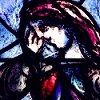
Notice that the verb translated "reason together" (יָכַח) is related to the word for "reproof," i.e., tochachah (תּוֹכֵחָה). All sound "reasoning" must begin with the foundational truth that people must turn away from their evil inclinations by returning to God in repentance (i.e., teshuvah). They must understand moral "cause and effect" and turn away from evil or else suffer the consequences of their choices (Gal. 6:7). In other words, the LORD is making an argument here and is inviting his listeners to follow his reasoning. If you turn to Me with all your heart and change your ways, then you will be cleansed from your guilt and you will find your deliverance... Note further that the little phrase, "says the LORD" (יאמַר יְהוָה) is imperfect tense - the LORD is always saying this and will continue to do so. Ultimately God is always calling for our heartfelt teshuvah, and no matter how "scarlet red" our sins might be, this word reveals that the gates of repentance are always open for those who sincerely desire to draw near to Him for healing....
The phrase, "Come let us reason together" could also be be translated as "Go and argue..." Go, rather than "come," suggests that the people should perform cheshbon hanefesh - an "accounting of the soul" - to better understand why their judgment is coming... The conclusion presents a logical dilemma: "If you are willing and obedient, you shall eat the good of the land; but if you refuse and rebel, you shall be eaten by the sword; for the mouth of the LORD has spoken" (Isa. 1:19-20). The verdict had already been reached by God, and now the people were forced to choose between two alternatives: "eat or be eaten," partake of God's goodness or be devoured by their own evil ways...
The prophet then goes on to lament the fate of Zion. "How (i.e., eykha: אֵיכָה) the faithful city has become a prostitute, she who was full of justice! Righteousness once lodged in her, but now murderers. Your silver has become dross, your best wine mixed with water. Your princes are rebels and companions of thieves. Everyone loves a bribe and runs after gifts. They do not bring justice to the fatherless, and the widow's cause does not come to them. Therefore the Lord declares, the LORD of hosts, the Mighty One of Israel (אֲבִיר יִשְׂרָאֵל): "Ah, I will get relief from my enemies and avenge myself on my foes. I will turn my hand against you and will smelt away your dross as with lye and remove all your alloy" (Isa. 1:21-24). The judgment that would befall Judah would be a "refining fire" intended to purify the people and restore God's purposes for Zion: "Afterward you shall be called the city of righteousness, the faithful city" (Isa. 1:26).
ציון במשׁפט תפדה
ושׁביה בצדקה
tzee·yohn · be'·meesh·paht · tee·pah·deh
ve'·shah·ve'·ha · beetz'·dah·kah

"Zion shall be redeemed by justice,
and those who return to her by righteousness."
(Isa. 1:27)
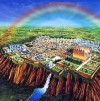
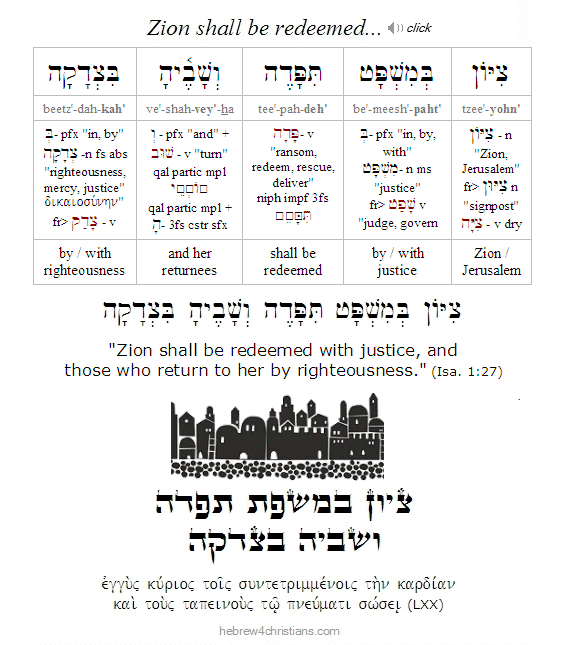
The prophet Jeremiah, an eyewitness of Isaiah's vision fulfilled, later proclaimed, "You have rejected me, declares the LORD; you keep going backward, so I have stretched out my hand against you and destroyed you - I am weary of relenting. I have winnowed them with a winnowing fork in the gates of the land; I have bereaved them; I have destroyed my people; they did not turn from their ways" (Jer. 15:6-7). These words not only apply to the historical fate of Judah, but they also resound as a warning to all nations that forsake the LORD (Psalm 2:1-5). "Rebels and sinners shall be broken together, and those who forsake the LORD shall be consumed" (Isa. 1:28). During the future time of the redemption of Israel, during the Great Tribulation, "the powerful will be like a thread of yarn, their deeds like a spark; both will burn together, and no one will put out the fire" (Isa. 1:31).
The redemption of Zion was accomplished by the cross of Yeshua, and all those who repent by trusting in Him are declared tzaddikim. Nonetheless the promise of Zion remains unfulfilled and will remain so until the prophesied End of Days. During that time "all Israel will be saved," though this will occur after the time of Great Tribulation - a period of time that the destruction of Judah itself foretold. Time is short for us, chaverim.
May God help us turn to Him be'khol levavkha - with all our hearts. Amen!
|


